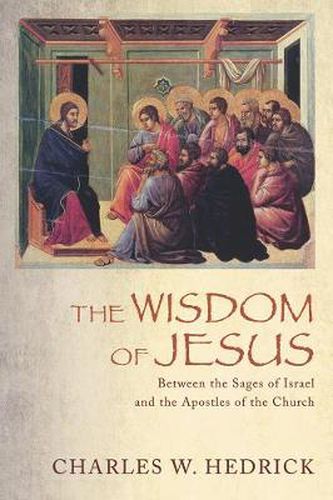Readings Newsletter
Become a Readings Member to make your shopping experience even easier.
Sign in or sign up for free!
You’re not far away from qualifying for FREE standard shipping within Australia
You’ve qualified for FREE standard shipping within Australia
The cart is loading…






This title is printed to order. This book may have been self-published. If so, we cannot guarantee the quality of the content. In the main most books will have gone through the editing process however some may not. We therefore suggest that you be aware of this before ordering this book. If in doubt check either the author or publisher’s details as we are unable to accept any returns unless they are faulty. Please contact us if you have any questions.
How would the image of Jesus appear if it were based only on sayings that scholars generally agreed originated with Jesus? And how would the wisdom of Jesus reflected in those few sayings compare to the wisdom of the sages of ancient Israel and the apostles of the early first-century church? To answer such questions historians face serious difficulties. Everything we know about Jesus comes from what later writers thought about him; none of the things they claimed he said came directly from him. Everything in the early Christian gospels is either derived from historical memory, or is borrowed, or invented, Hedrick claims. Even those few sayings receiving near-universal agreement from historians as sayings of Jesus can only be affirmed as probable rather than certain. The aim of this study is to allow Jesus to speak for himself directly to readers, as nearly as possible in his own words without the theological explanations of his interpreters. The resulting image of Jesus that emerges is a complex picture of a first-century lower-class man who was not religious in a traditional sense. His discourse was the language of the secular world and addressed issues of common life.
$9.00 standard shipping within Australia
FREE standard shipping within Australia for orders over $100.00
Express & International shipping calculated at checkout
Stock availability can be subject to change without notice. We recommend calling the shop or contacting our online team to check availability of low stock items. Please see our Shopping Online page for more details.
This title is printed to order. This book may have been self-published. If so, we cannot guarantee the quality of the content. In the main most books will have gone through the editing process however some may not. We therefore suggest that you be aware of this before ordering this book. If in doubt check either the author or publisher’s details as we are unable to accept any returns unless they are faulty. Please contact us if you have any questions.
How would the image of Jesus appear if it were based only on sayings that scholars generally agreed originated with Jesus? And how would the wisdom of Jesus reflected in those few sayings compare to the wisdom of the sages of ancient Israel and the apostles of the early first-century church? To answer such questions historians face serious difficulties. Everything we know about Jesus comes from what later writers thought about him; none of the things they claimed he said came directly from him. Everything in the early Christian gospels is either derived from historical memory, or is borrowed, or invented, Hedrick claims. Even those few sayings receiving near-universal agreement from historians as sayings of Jesus can only be affirmed as probable rather than certain. The aim of this study is to allow Jesus to speak for himself directly to readers, as nearly as possible in his own words without the theological explanations of his interpreters. The resulting image of Jesus that emerges is a complex picture of a first-century lower-class man who was not religious in a traditional sense. His discourse was the language of the secular world and addressed issues of common life.